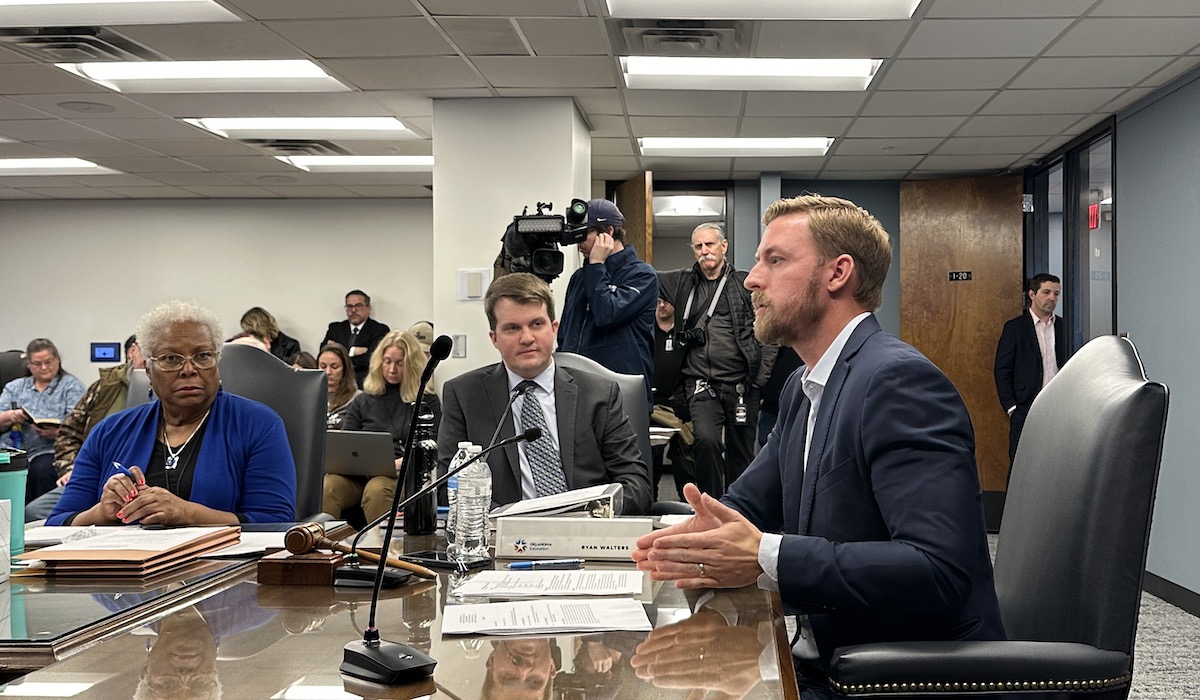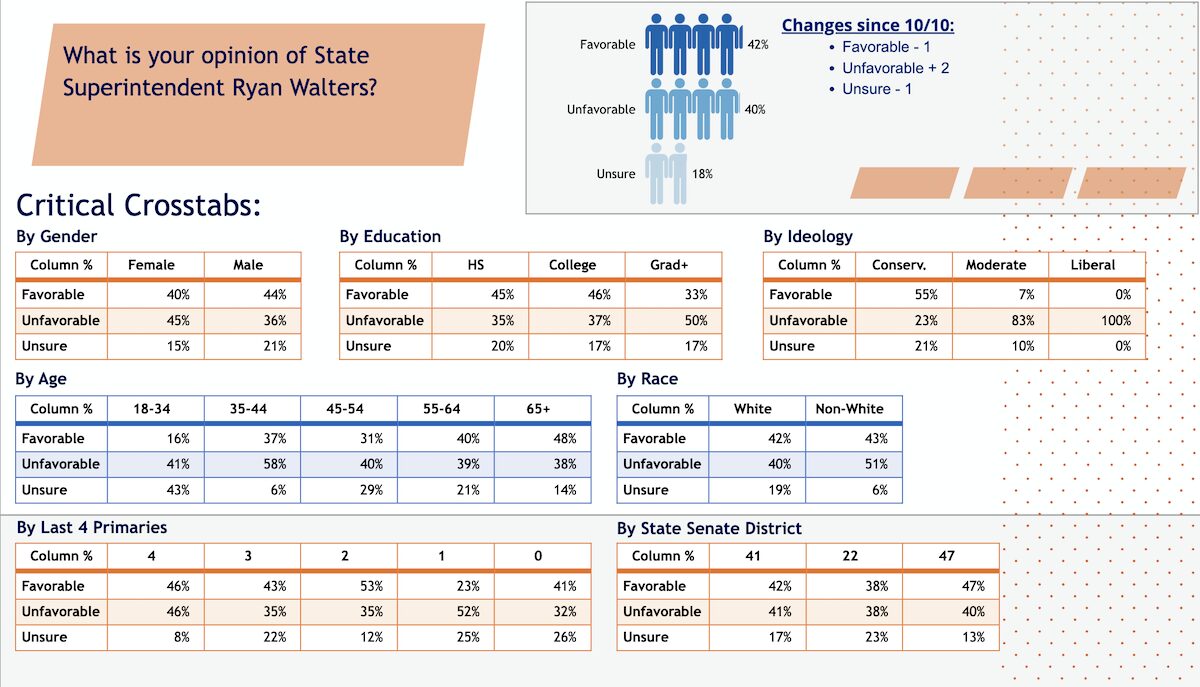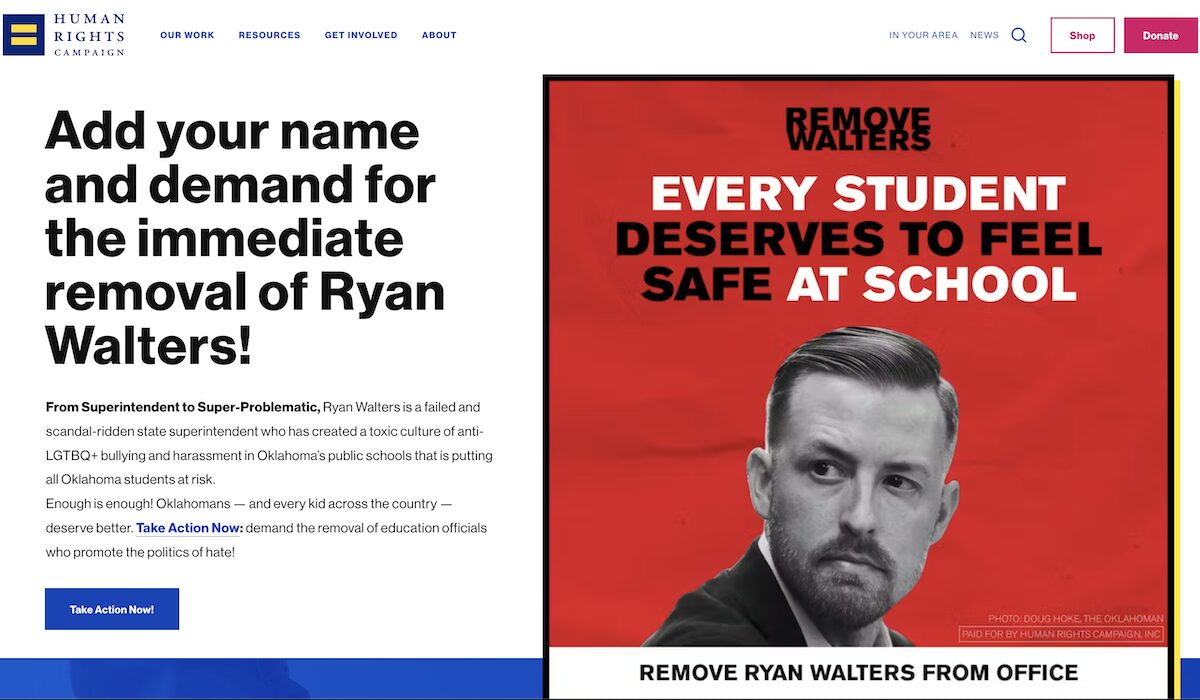
After 15 tumultuous months in office, State Superintendent of Public Instruction Ryan Walters appears to have lower favorability with potential Oklahoma voters than he would like, according to multiple polls conducted recently.
The polling data — some released publicly by an online research firm tied to Democratic causes and some provided to NonDoc privately by Republican operatives analyzing local legislative races — show Walters with significant unfavorable ratings among a variety of demographics.
In a pair of polls regarding Republican House district primaries, Walters’ favorability scored 15 percent and 22 percent lower than GOP Gov. Kevin Stitt’s. Walters’ support lagged among women and younger age groups most likely to have students in Oklahoma public schools.
Separate data from a statewide survey of Republicans — which was presented to the House Republican Caucus earlier this year — show his favorability at 38.5 percent and his unfavorable score at 28.6 percent.
An open-ended question in the same statewide GOP poll asked respondents, “How do you feel about Ryan Walters, and why?” Those responses painted an even more negative perception of Walters, and only 0.6 percent of responses registered as “approve” or “positive.”
Instead, “disapprove” or “negative” topped results with 25.9 percent. Sentiment that Walters is “bad for public schools” registered at 19.1 percent, and another 9.8 percent of responders fell into a category of “closed-minded/divisive/arrogant.” Another 8.2 percent said “not qualified,” and 5.7 percent registered as “extreme.” Another 9.7 percent responded with a “neutral/unsure” answer.
All told, the open-ended question seeking description of Walters in “as many or as few words as you’d like” yielded 72.2 percent negative opinions from the Oklahoma Republicans surveyed.
As a wave of additional headlines revealed further OSDE staff departures and the agency’s contract with a firm to raise Walters’ profile on the national political stage, a spokesman for Walters did not respond to a request for comment about the polling last week.
House districts polls: Walters less favorable than Stitt

Like him or not, Ryan Walters’ brief political career has thrust him into the spotlight.
Amid a barrage of negative headlines about Walters’ handling of state funds, repeated clashes with the Oklahoma Legislature, an exodus of employees from the State Department of Education and continued chatter about the scope of state and federal investigations, the recent polling numbers offer a glimpse into the broader local perception of a controversial politician with a growing national reputation.
Although Walters has faced intense criticism over his culture-war policies, his agency’s execution of its duties, and his chief political advisor’s rhetoric and Texas residence, the former public school teacher has maintained that his 2022 election with nearly 57 percent of the vote was a “mandate” to carry out his education goals. The criticism, he has claimed, comes mainly from those on the political left, and he has questioned the conservative bonafides of Republicans who critique his actions.
“When I hear folks say, ‘Why are you talking about stuff you said on the campaign trail?’ I want you to hear — what does that mean?” Walters told legislators in May 2023. “So was the expectation that I lied to voters when I told them I’m going to get indoctrination out of schools? (…) I am going to do what I said I’m going to do. (…) Guys, I meant it.”
But the polls conducted over the last few months would seem to suggest that voters — including Republicans — have concerns about Walters’ job performance.
A pair of recent polls conducted among likely GOP voters in two House districts show Walters trailing Stitt in favorability scores. Provided on the condition of anonymity by a Republican who is engaged in the 2024 electoral cycle, one poll focused on an open suburban district and the other examined a rural seat where a conservative incumbent now faces a Republican challenger.
In November and February, respectively, Walters trailed Stitt in favorability among 259 likely Republican voters in House District 39, which represents northwest Edmond, and among 249 likely Republican voters in House District 2, which covers far eastern Oklahoma along Interstate 40.
Because the polls focused on House districts, their limited respondents compared to typical statewide surveys resulted in a roughly 6.1 percent margin of error for each.
Of the Republicans polled in HD 39 in ahead of the district’s special primary election, 42 percent expressed favorable views of Walters, while 57 percent had positive views toward Stitt. Women viewed Walters less favorably than men, and younger demographics tended to favor the superintendent less than older demographics.
Likely HD 39 Republican voters in the 35 to 44 age group had the most negative perceptions about Walters, with 58 percent viewing him unfavorably.
Among all HD 39 GOP respondents polled, 28 percent identified inflation as their most important political issue. Another 22 percent listed the border and immigration as their most important issue, and 13 percent said education funding topped their priorities.
In the other poll, conducted in February among Republicans in HD 2, the 249 voters surveyed showed an even starker contrast between Walters and Stitt.
An even 50 percent of likely Republican voters there had favorable views of Stitt. Just 28 percent held the same opinion of Walters, but a higher percentage was unsure of or had never heard of Walters. Stitt’s unfavorable rating also scored higher than that for Walters, with 34 percent expressing displeasure with the governor and only 20 percent responding unfavorably to Walters.
Similar to the results in HD 39, fewer women than men viewed Walters favorably in HD 2, and older demographics expressed more positive views about him. His 37 percent favorability score among Republicans aged 55 to 64 topped all age groups.
In terms of priorities, 26 percent of likely HD 2 voters said the border was their most important issue, followed by 23 percent saying inflation and 15 percent listing education funding as most important.
“Polling is done so people understand what is gong on in their districts in the Republican primary,” the person who provided NonDoc the legislative polls said on the condition of anonymity. “All of these other things drive their voters who are going to vote in June.”
While Rep. Ronny Johns (R-Ada) declined to comment on whether polling had been presented in caucus, he said he would not be surprised if the numbers referenced in this article were in line with his own district. A former educator who has voiced frustrations with Walters’ rhetoric and confusion at OSDE, Johns said Walters has become a polarizing figure in Pontotoc County.
“I get asked about him more than I do anything else,” Johns said. “Even from Walters’ supporters, they just like to see more evidence of running the department, supporting our administrators and our teachers and our schools. They want to see more evidence of that and things more than just the negative rhetoric that comes out of our State Department of Education.”

Respondent: ‘He is going to ruin the public education system’
Earlier this year, members of the House GOP Caucus received an overview of a poll conducted among Republicans statewide. Photographs of slides provided to NonDoc show robust discussion of policy priorities and opinions about Stitt and Walters, but the full poll and all of its data were not provided.
Still, slides shown to House Republicans show Walters’ strongest and weakest support among various demographics in the GOP. Pollsters asked a basic favorable or unfavorable question, and they also posed an open-ended question asking how respondents view the state superintendent.
Although Walters polled near 50 percent favorability among older men, men without college degrees, and voters who identify as “Trump GOP,” Catholic, “very conservative,” “extremely conservative” and “suburban,” more than the 70 percent of responses to the open-ended question were negative.
In at least two slides, pollsters highlighted verbatim responses from some Republicans who criticized Walters.
“[Ryan Walters] does not know what he is doing, and he is going to ruin the public education system. I am a Republican and conservative, but [Walters] is beyond measure and creating issues,” said one man between the ages of 50 and 64 who identified as a “Trump Republican.”
A woman between the ages of 65 and 74 who also identified as a “Trump Republican” decried Walters’ attitude while acknowledging that improvements need to be made.
“I know education needs to be greatly improved but sometimes he is very abrasive to people,” the woman said. “He needs to tone down his attitude a little.”
Another senior woman in that age bracket who identified as a “Traditional Republican” spoke more bluntly.
“Ryan Walters takes the dictator approach to education. He does not include the public, teachers, administrators, or others directly involved in the educational process,” the woman said.
Pollsters added their own summaries to the feedback they found:
Voters consider him “abrasive,” “crass,” and as coming across as too “direct” and “hard.” (…) They also think he doesn’t “respect” teachers and he does not “listen” to them. Essentially, they think he does care not one twit what anyone in the education field thinks. The way he is interacting with teachers is likely taking a toll on his image.
Examining “unfavorable” responses about Walters, pollsters noted that his support of school choice efforts “popped up a few times as well as his interactions with [Tulsa Public Schools].” However, the pollsters said “they’re not by-and-large the reason that Republican voters view him negatively.”
At State Board of Education meetings and other engagements, Walters has defended his actions and rhetoric by insisting that everything he does — from threatening a possible takeover of Tulsa Public Schools to implementing sweeping new agency rules — is intended to improve education in Oklahoma.
“There is a loud and vocal crowd, a minority for sure, that say that all that is needed to fix the problems in education is to toss more money and to leave everything alone,” Walters said in January 2023 at his first meeting chairing the State Board of Education. “This is not the direction we are going. We will reform all of our education system. There will be accountability and transparency. There will be school choice. We will ensure that indoctrination and [critical race theory] are eliminated in our state. We will also make sure that our kids are safe. There will be no boys in the girls bathrooms. There will be no pornography in our schools. We will make sure all of our vendors and the schools are focused on education and not diversity, equity and inclusion.”
On the topic of DEI, Walters’ statement appears to be supported by the statewide GOP poll presented to the House Republican Caucus. Asked if they support or oppose Stitt’s recent executive order limiting the use of state funding, property and resources regarding DEI initiatives, 63.5 percent of respondents said they supported Stitt’s order.
Nonetheless, Stitt and House Speaker Charles McCall have somewhat distanced themselves from Walters with regard to recent reports that the State Department of Education paid a private PR firms to book Walters for speaking engagements and raise his national profile.
“He should not be spending state money — taxpayer dollars — for personal promotion,” McCall told reporters March 18. “[The House] can certainly commit to a limits bill within the education budget to specifically prohibit that type of expenditure moving forward.”
On March 15, Stitt also declined to defend Walters’ hiring of the PR firm.
“It’s a fair point to ask questions,” Stitt said. “Every agency that hires PR firms and those kinds of things, it’s an honest question: Is that a good use of taxpayer dollars?”
Asked March 18 to give Walters a letter grade of “A” to “F” for his first 15 months in office, McCall said that question is “not to be answered by the speaker of the House.”
“That’s a question that’s answered by the people of the state of Oklahoma, and that goes for me and every other elected official,” McCall said. “In the House of Representatives, people in the state get to give us our our report card every two years. Unfortunately, for the Senate, and statewide (elected officials), [voters] only get them once every four years. Maybe we ought to change that. Maybe everybody should be on that two-year cycle like the House.”
HRC-paid poll: Walters’ GOP favorability at 33 percent

While the polling discussed above reflects GOP voter bases surveyed by national polling firms hired by Oklahoma Republicans, another poll conducted statewide with an online questionnaire between was released last week by a national firm hired by the Human Rights Campaign, which has called for Walters’ removal owing to his stances on LGBTQ issues.
Conducted via Survey Monkey on March 15 through March 18 following targeted social media ads, the Change Research poll featured 665 responses split among 51 percent registered Republicans, 22 percent registered Democrats and 27 percent registered independents. The poll was weight-adjusted and carried a 4.3 percent margin of error, according to a methodology document.
Online opt-in polls, however, have received academic criticism owing to inherent factors in respondent selection. In the HRC-sponsored poll examining Walters, his initial favorability numbers among only Republican voters stood at 33 percent favorable and 25 percent unfavorable.
Further questions in the poll, however, were strongly slanted against Walters in a manner often described as “push” polling. One question opened:
Ryan Walters isn’t doing the job Oklahomans hired him to do. Oklahoma ranks 48th in the country in education, according to US News and World Report. One survey found that 72 percent of Oklahoma school districts hadn’t received requested funding administered by his office, leaving schools short millions of dollars.
Respondents were asked to say whether they agree with Walters or disagree with Walters after reading that statement. Responses totaled three-to-one in disagreement.
Among all surveyed by the Change Research poll, respondents largely disapproved of Walters’ job performance (55 percent) and said he is not a good role model for kids (61 percent).





















